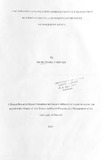| dc.description.abstract | For many decades peacemaking between Turkana and Pokot communities in Northern Kenya has been very elusive. This study therefore examined major factors influencing cross border conflict resolution between the two communities with the aim of determining the extent to which local politics, local culture, social and the prevailing economic conditions influence interventions for durable conflict resolution. Cross border conflict has been evolving taking many forms currently manifested through regular cattle raids, highway banditry, conflict over resources such as land, pasture and water. The study was carried out in two divisions, Kainuk in Turkana County and Sigor in West Pokot County. Questionnaires and focused group discussions were used to collect data.
Data analysis was done with the aid of the SPSS tool. Rank correlation and regression techniques were used in data analysis and based on the results of the data analysis, the study findings clearly indicated that economic factors had the highest influence in cross border conflict resolution with key elements such as deepening poverty, high unemployment, over-reliance on single livelihood and natural resource competition ranked high as the main economic drivers. Political factors came second and most of the respondents pointed out to lack of local leaders peace building capacities, incitements, disregard of the traditional governance systems, long held marginalization and lack of local communities in development activities and implementation which played a key role in influencing cross border conflict building and resolution.
Breakdown of social networks and decline of intercommoned interactions through sports and intermarriages reduced extent of harmonious co-existence which previously existed. Finally cultural factors which played a greater influence were ingrained in deep held value system, rituals, rites and beliefs. The contemporary setting within the two communities indicated that these cultural elements had been abdicated and thus played a lesser role in cross border conflict resolution.
The study concludes that the four factors discussed had high level of influence on cross border conflict resolution and therefore recommended strengthening of cross border policing, enforcing laws that prohibit politicians from interfering in peace building efforts, creating investments on the local economy and diversifying livelihoods of the communities while at the same time reviving social networks with a high premium on peace, and also taking into account positive cultural elements that paid dividends on cross border peace. These actions to be taken by the by government, civil society, United Nations agencies, donors and the Non Governmental Organizations. | en_US |

